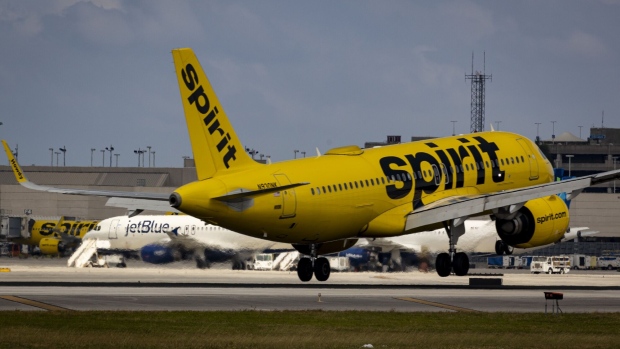Feb 8, 2024
Spirit Airlines Reports Smaller-Than Expected Loss, Shares Rise
, Bloomberg News

(Bloomberg) -- Spirit Airlines Inc., fighting to preserve its acquisition by JetBlue Airways Corp., said revenue will increase this quarter more than analysts were expecting and that it has the liquidity needed to stand on its own even as concerns mount about its financial future.
Revenue will be in the range of $1.25 billion to $1.28 billion, Spirit said in an investor update Thursday, above the $1.22 billion expected by analysts. Slowing capacity growth at Spirit and other carriers this year is helping match supply with demand, while current travel booking trends “further our confidence that the domestic environment is beginning to rebound,” Chief Executive Officer Ted Christie said in a statement.
Spirit, which has bled cash over much of the past two years, has struggled financially and is seeking to combine with JetBlue in a $3.8 billion deal. A court ruling last month that blocked the transaction sent the company’s shares and bonds into freefall, with some analysts predicting that the company would need to file for bankruptcy.
The airline sought to counter that view on Thursday, saying it expects its operations to turn cash-flow positive in the second quarter “and beyond,” and that its $1.3 billion in liquidity at year-end “should be more than adequate” to get the business to that point. Spirit is also pursuing an expedited appeal with JetBlue of the ruling.
Spirit’s shares rose 5.5% at 9:34 a.m. in New York. The stock had plunged 58% this year through Wednesday.
Capacity Constraints
The low-cost carrier also reported its adjusted fourth-quarter loss was $1.36 a share, narrower than analysts’ estimates, amid lower costs for fuel and other items. Revenue of $1.32 billion matched Wall Street views, with demand for travel strong over the December holidays.
Operating margins this quarter will be negative 12% to negative 15% on an adjusted basis and capacity will shrink by about 1.5%.
The airline expects capacity for the full year to be flat to rising in the mid-single digits in percentage terms from 2023 levels. Those plans compare to a 14.6% expansion last year.
At least three other major carriers — Southwest Airlines Co., JetBlue and Alaska Air Group Inc. — have also slowed capacity growth this year in an effort to boost fares in the domestic market by tightening supply.
A manufacturing defect in engines made by RTX Corp.’s Pratt & Whitney unit will ground Spirit planes throughout the year, ranging from an average of 13 this month and climbing to 40 by December as they undergo lengthy repairs. Talks with Pratt & Whitney over compensation for the groundings have “progressed considerably” since October but no agreement has been reached, Spirit said. The carrier is also contending with uneven demand, sluggish supply chains and higher costs that have plagued the domestic market.
JetBlue, Bonds
Spirit hasn’t given up on being acquired by JetBlue, despite the federal court ruling that the cash deal would violate antitrust law by stifling competition and eliminating an option for price-wary travelers. An appeals court granted Spirit’s request for a speedy review and is set to hear arguments in June, the airline said.
The prospect of a failed deal has made bondholders wary of Spirit’s ability to address its debt commitments. Some creditors have organized and sought legal advice, Bloomberg News has reported.
Read More: Spirit Air Creditors, Anticipating Debt Talks, Tap Legal Adviser
“While Spirit remains focused on consummating the merger with JetBlue,” the company said, it “is aware of its 2025 and 2026 debt maturities and is assessing options to address those maturities when the time is appropriate.”
(Updates with opening share price in fifth paragraph)
©2024 Bloomberg L.P.


